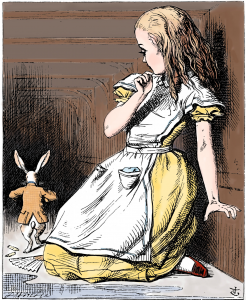Part I: Bloggers and the DMCA
In March, 2019, the US Supreme Court released its decision in Fourth Estate Public Benefit Corp. v. Wall-Street.com, clarifying that – for the purposes of bringing infringement actions before a court – copyright registration of a work is not “complete” until the registration certificate for it comes back from the Copyright Office (to the person or entity who sent in the registration). While reading this decision – authored by the late Justice Ginsberg — it occurred to me that it might have immediate application to the routines regular bloggers (and podcasters) use to protect their work under copyright. As I dug down further on the topic, I ended up tumbling down a bit of a rabbit hole concerning certain nooks & crannies of copyright that I hadn’t known much about; at that point, I thought it might be useful (to some) and interesting (to others) to share them here.

Imagine yourself just sitting down to building your own little media empire. You’re blogging on your own, posting once a day; podcasting a weekly news wrap-up on Fridays – and things are looking up. “The future’s so bright I gotta wear shades,” as Timbuk 3 said back in the 80’s.
And someone, maybe your brother-in-law with a law degree, says, “Hey, what about your copyrights? Whatcha gonna do if someone steals your stuff?” And he goes on . . . he’s on a roll now: “What about your liability, if one of your readers pastes a whole article in the Comments section?” And then he toddles off, looking to grab another beer from your fridge. “Never liked that guy,” you think. And you reach for the analgesic of your choice – probably not for the first time.
Fear not! There are standard answers to many of these questions. While one could always go read Title 17 of the United States Code (the US Copyright Act, which doesn’t include any of the reams of judge-made law that also apply), for most of us laypersons the resource of first resort should be the many text and video publications of the Copyright Office’s Education Division, which is the source of dozens of informational guides, known as Circulars. These are not written in legalese and are intended for use by the general public. When I have a copyright question, I tend to rely on these whenever possible – although nothing is completely comprehensive, especially for freshly arising problems. And, they do not constitute legal advice: only your own lawyer is able to provide you with that.
The DMCA is Your First Line of Defense
So, say you’re a newly minted blog site owner/operator. Featured prominently on the first page of the Copyright Office’s Circular 66 (“Copyright Registration of Websites and Website Content”) are the following words: “The Copyright Act does not explicitly recognize websites as a type of copyrightable subject matter.” That might be enough to stop you in your tracks. But it needn’t put you off your project. As I like to say, no one is born knowing this stuff.
Under US copyright law, typical blog sites are understood as a collection of pages, basically a stack of written materials, maybe supplemented by still images, moving images, and perhaps audio recordings. (I am putting aside live streaming, for now; I plan to cover that in a later post.) Each of these “works in a fixed form” is individually registerable for copyright. If that sounds tedious and potentially expensive, that’s because it is. The good news is that you don’t have to go that route, especially if your site is of a non-commercial nature. For original content published primarily online, the starting place for understanding and applying copyright protections would have to be the provisions of 1998’s Digital Millennium Copyright Act (DMCA), which was a substantial-sized set of amendments, mostly additions, to the basic Copyright Act. Having a procedure for the protection of small-scale (even personal) web sites was certainly an important part of what its legislative drafters had in mind.
The DMCA was, in part, a national implementation of a World Intellectual Property Organization (WIPO) treaty, and this aspect may have helped its passage in a period of (sometimes bitterly) divided government. Although the DMCA has an extensive set of provisions — some of them quite technical — affecting any number of other interesting intellectual property matters, the most relevant and often discussed sections for bloggers, podcasters and similar content creator/publishers are § 512 and §1201.
Section 512 provides, among other things, for the notice-and-takedown (and reply-notice-and put-back) rules, of which YouTube’s “millions and millions served” implementation provides a handy and well-known (but not well-loved) example. The statutory provision creates a “safe harbor” of liability from copyright infringement for online service providers (OSP’s —the Facebooks and Reddits of the world, but also the blogger.com’s and the telephone companies). Along with these rules, there are some other qualifying requirements. So, you’ll want to study up on that.
Section 1201 provides a set of rules collectively referred to as “anti-circumvention”, which might be thought of as addressing the propensity of users to break open the ‘digital locks’ that you may have placed on your super-valuable content. Basically, 1201 is about enforcing your ability to regulate access, if that’s something you opt to do. For example, were someone to bypass your subscription paywall and begin peeking in on all your premium content, you’d be in 1201-land, and you will definitely want to think about calling your lawyer at that point.
As Natalie Mootz at blogging.com put it, “The DMCA is your friend.” I mentioned DMCA’s requirements a little above; possibly the most immediately significant among these is for you to designate a DMCA Agent.
Note: There are many well-known and valid criticisms of the DMCA in all its aspects. I agree with those who suggest that it is probably past due for an update. With any luck, there’ll be a post on Velocity of Content discussing that legislative effort in 2022
Conclusion – And a Look Ahead
I started with a quick reaction to the decision in Fourth Estate vs Wall-Street.com and, as I said, thinking about the implications of that really opened a can of worms. I hope this post provides a quick overview of some provisions of the DMCA most relevant to any web publisher – even the smallest. In subsequent posts, I plan to cover the following topics: Registering your web site for copyright protection – in whole and in parts; how podcasts are somewhat different than blogs for purposes of copyright protection; how the CASE Act (creating a form of small-claims litigation) will affect all this, starting next year; some alternative or supplemental approaches to copyright for blogs, including the use of Creative Commons licenses; and I’ll finish up with a look at the copyright aspects of operating a YouTube channel.


